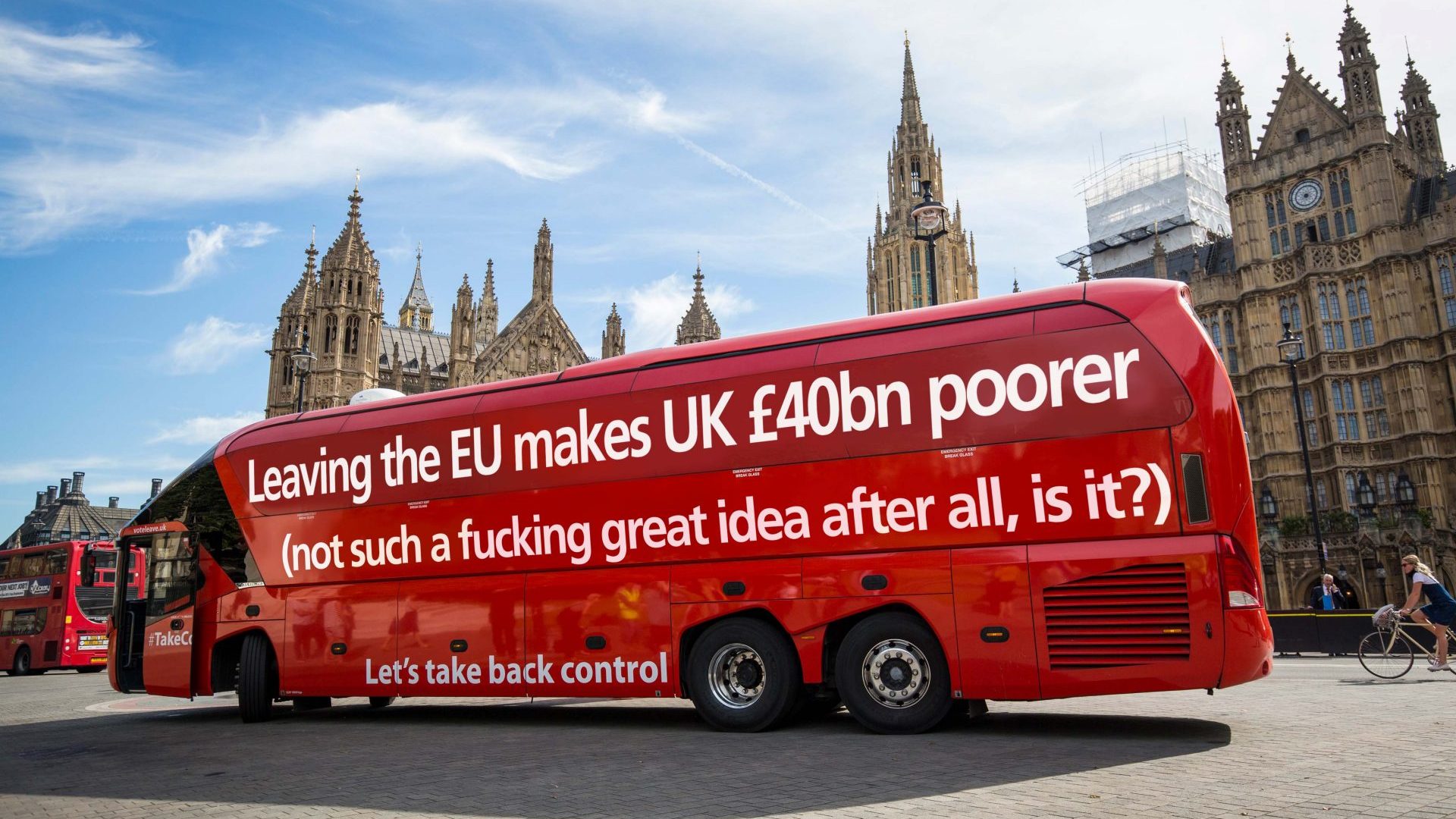The go-to prediction of how much damage Brexit will do to the British economy comes from the Office for Budget Responsibility. It carries particular weight because the OBR is impartial, has access to the Treasury’s own data and statistics, and because it was set up to use the very best experts to check the government’s own economic forecasts and so lend them credibility. Just look at what happened to Liz Truss and Kwasi Kwarteng when they decided to have a budget without running it past the OBR first; it killed their political careers within days.
So, the OBR’s forecast from 2016 that Brexit would, in the long term, cost the UK economy 4% of GDP with a trade deal and 6% without one has been taken as the best estimate of what would happen and the OBR has stuck with its 4% average figure, so far.
It is worth noting that although it might not sound too bad, this is a permanent loss and not one that will be made good by higher growth following a recession.
It’s also worth noting that 4% is the equivalent of two very large recessions, on top of any other problems that might beset the UK economy. A decline of this scale would be the equivalent of half the entire defence budget, more than half of education, twice the local government budget, more than we spend on law and order and almost a quarter of the NHS and social care budget. It’s a very large hit.
But how accurate is that calculation? There are several reasons to think that the OBR has been too optimistic and that the complete mishandling of Brexit has made things much worse, with more pain to come.
The OBR’s own calculations are based on the UK getting a bog-standard trade deal with the EU, which it did. But it is also pretty much just an average of the existing studies available in 2016. Those ranged from the ones that predicted the UK would sail through Brexit with little damage to the one by the Treasury, which thought it would cost the economy 5%, and by the LSE, which thought somewhere between 6% and 9%.
So, it is perfectly possible that the 4% figure is wrong. There are increasing signs that the government’s own economic and political incompetence is in fact making the economic situation even worse – and will continue to do so.
For a start the OBR is unlikely to have taken into account the fact that the government has, because of its Brexit-driven extremism, pulled out of perfectly common-sense cooperation with the EU, threatened to tear up rules and regulations, and left industry on tenterhooks about its future direction. It even tried to tear up its own deal with the EU, and then its Brexit extremists introduced a budget so bad it brought down the prime minister and cost the country tens of billions of pounds.
As a result, it destroyed its own reputation for competence, trustworthiness and respect for the rule of law. All of these have added to the damage caused by Brexit. None of them were factored into those original calculations.
The agreement that the UK negotiated with the EU was a bare-bones trade agreement. After Theresa May set out her notorious “red lines”, there was little hope that anything else could ease the pain of Brexit. But even so, the UK government could have tried to maintain EU standards and regulations for industries and products. Instead, it has tried to create an entirely new set of business rules and standards along with new regulatory bodies to oversee them. The effect has been to lumber British companies with two lots of red tape and rules, along with the cost of testing and production standards.
On top of this, the promise to tear up every single EU law by the end of this year is a disaster for British firms. They now have no idea what rules and regulations they will be following in the near future, whether they will diverge from existing EU rules or have the same ones, whether they will face lighter touch or more stringent rules.
As the latest survey of Cost, Confidence and Competitiveness from Make UK, the manufacturing industry’s lobby group, makes clear, all this messing around is causing real damage to the economy. “More than half of manufacturers (55%) say this is the biggest risk to business confidence next year. It is clear the domestic political chop and change has led to significant policy churn, which in turn is making doing business in the UK much harder… And for non-UK businesses who may be considering investing in the UK, a large proportion (43%) disagree that the UK will be an attractive place to invest for non-UK businesses in 2023, versus just 29% who believe it will be.”
Considering business investment has flatlined since 2016, this is likely to mean at least another year when finance directors across the world decide to wait just a bit longer before deciding to invest in the UK. More probably they will decide now to invest somewhere else.
That mood has not been helped by the continuing battle over the Northern Ireland Protocol. This has made Brexit worse in so many ways it is hard to count them. It has led to the UK being left out of the huge Horizon research scheme run by the EU. It has also delayed talks on data transfer rules, accepting UK professional qualifications and the equivalence or not of UK financial regulations. All of these things may not grab headlines, but they do significant long-term damage to the UK. On top of all that, threatening to tear up a treaty you negotiated only a few years ago and as a consequence start a trade war with the EU and antagonise the US is hardly a move that inspires confidence in your political processes, the sanity of your leaders, or your economic prospects.
Hopefully this problem will be resolved soon by a British backdown, but a great deal of harm has been done – the persistence of the attacks by Brexit ultras on the Northern Ireland Protocol is not reassuring.
None of these cock-ups could really have been accounted for in the original calculations of how Brexit would work out economically. If past experience had been anything to go by, investors and the markets would have judged that even in the worst of times, the UK was well governed, with an excellent civil service, a good central bank and an almost religious devotion to the rule of law.
Now all that has gone, taking with it a large slice of the British economy. John Springford’s latest work for the Centre for European Reform at the London School of Economics puts the figure at 5.5%. He uses a “doppelganger” economic model that compares the UK’s economic performance to a group of countries that have performed similarly in the past. The paths of the UK and its “twin” separate in 2016 and the gap between the two is now 5.5%. In short, if we had stayed in the EU we would be much better off than we are now.
The three big hits have come about because of a decline in UK trade, a drop of 11% in investment, and finally because of the fall in EU immigration, which is hitting numerous sectors. As he says, “immigration almost automatically raises GDP”. Therefore ending the free movement of EU workers has damaged UK growth.
“We have had such a difficult time with investment, which has been so stagnant,” says Springford, “and we know low investment now reduces growth in the future. And so my suspicion is that we are going to have a widening gap between the UK and the doppelganger for a while.”
The damage caused is already massive. If the economy had not declined by 5.5%, then the chancellor would have another £40bn a year in tax to spend.
Then, of course, there is the elephant in the room. No – not Nadhim Zahawi’s decision to settle his multimillion-pound tax bill. The Liz Truss and Kwasi Kwarteng “mini-budget” might have been shortlived, but its disastrous consequences will be felt for years to come. It was also the budget that the Brexiteers had been dreaming about for years.
Remember the praise from the right wing commentariat and the Tufton Street “think tanks”? This was the “first truly Tory budget in decades”, one that showed how a post-Brexit UK could become Singapore-on-Thames and enjoy a low tax, low regulation economic boom. Also remember that the chancellor had to fire his most senior and respected civil servant to force it through, a move that was seen at the time by the Brexit mob as a sign that Remainiac saboteurs were on the way out.
Well, that Brexit budget pipe dream did not last much more than a week, and it cost the British economy well over £30bn. It has left the country with a much higher tax burden, much higher borrowing – and at a higher cost – for everyone; and all because of the so-called “moron premium”.
That means foreign investors now need paying extra to put their money in the UK, to compensate for the risk that it is run by idiots.
And who is to say they are wrong?




